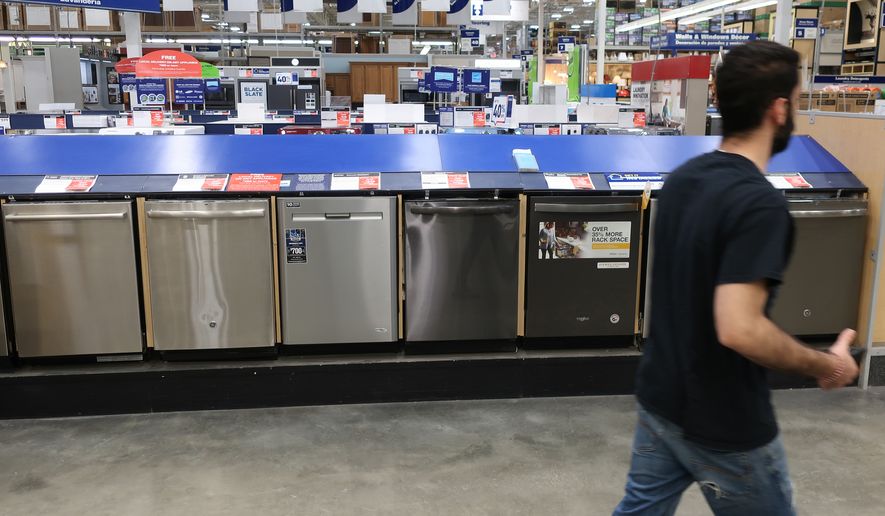For years, consumers have complained about slower, noisier dishwashers that produce dirtier dishes, the result of tighter federal efficiency regulations that the Trump administration is now seeking to unload.
The Energy Department last month proposed a rule to create a new dishwasher product class that would finish a normal cycle in an hour or less by using less stringent energy standards than permitted under the current rules.
Sam Kazman, general counsel of the free-market Competitive Enterprise Institute, which led the charge for the regulatory clean-up, said the ever-tighter restrictions on energy and water have produced machines that take twice as long without getting dishes as scrubbed as earlier models.
“Basically, these dishwashers have turned into crap, and it is solely the result of the Department of Energy’s so-called efficiency regulations,” said Mr. Kazman.
He cited data from Consumer Reports showing that average wash times have increased from about 70 minutes in 1983 to 140 minutes in 2018 as manufacturers slow down the cycles to “compensate for the negative impact on cleaning performance,” as the department acknowledged in 2016.
“The result has been ever longer and longer cycle times,” said Mr. Kazman. “Back in the late ’70s, they were reporting one-hour times, not just for cleaning but for drying as well. Now it typically takes over two hours, in some cases two-and-a-half hours, and the dishes come out neither very clean nor very dry.”
Opposing the administration effort are environmental groups and lawmakers who argue that allowing dishwashers to use more electricity will reverse efforts to combat climate change.
House Energy and Commerce Committee Chairman Frank Pallone Jr. called Energy Secretary Rick Perry’s approval of the dishwasher petition “the latest in DOE’s series of energy efficiency rollbacks.”
“It’s outrageous to see the Trump Administration rewarding elitist right-wing think tanks by granting their energy efficiency rollback petitions,” said Mr. Pallone in a July 16 press release. “This announcement penalizes both the innovators giving us better, more efficient appliances and the consumers who use them.
He added, “When the rubber meets the road, this Administration consistently bets against American innovation, shortchanges consumers and takes every action possible to make it harder to address our climate crisis.”
That said, most of the comments submitted so far to the Federal Register show that consumers have taken a shine to the idea. The deadline for commenting is Sept. 16.
“[Today’s] dishwashers do a lousy job that takes forever. Change them back to the way they were!” said Aristede Michelini in a comment.
Said Marilyn Bell: “Stop the regulations, dishwasher makers are still forced to comply with stupid bureaucratic mandates, leaving us with pathetic dishwashers and dirty dishes.”
Eloise O’Brien said she and her husband bought a dishwasher in 2017, but that they had to choose longer wash and extra dry cycles “to ’maybe’ get clean, dry dishes.”
“We mostly wash by hand anymore. At least we know we have clean, dry dishes,” she said. “Get rid of the regulations.”
It’s unclear whether the efficiency rules have actually reduced water and electricity use, said Mr. Kazman, given that some consumers report running their dishwashers twice to ensure that their plates, bowls and utensils emerge unsoiled.
“First, it treats people’s time as being something that’s of zero value,” said Mr. Kazman. “Secondly, it’s questionable whether it even achieves those less-energy, less-water goals because a lot of people are now pre-rinsing their dishes, or they’re running several cycles. And none of that does anything as far as water and energy savings.”
Surprisingly, foes of the proposed rule include dishwasher makers. The Association of Home Appliance Manufacturers filed a comment to last year’s proposed petition saying that companies have already invested heavily in meeting the tighter energy standards, and that the costs of developing a new line would be “significant.”
“Were DOE to develop a new product class for dishwashers with cycle times less than one hour, the result will likely be stranded investments as manufacturers would essentially be required to abandon these innovations in efficiency,” said the AHAM comment.
Another downside for the industry is the regulatory uncertainty. If a Democrat wins the presidential race in 2020, manufacturers could be forced to abandon their investments in the one-hour machines as the regulatory pendulum swings back to the left.
“They see it as both a regulatory and maybe a financial risk,” said Mr. Kazman, adding, “Once again, we’re not talking about eliminating the high-tech machines. Those will still be on the market for those who want them.”
Supporters of the uber-efficient dishwashers argue that they save consumers money on electricity and water costs, albeit not much. The association said that replacing a 12-year-old dishwasher with a new average-efficiency machine “will save the American consumer $13 per year in utility costs.”
Citing Mr. Pallone’s dig at CEI as an “elitist right-wing think tank,” Mr. Kazman argued that if anyone’s being elitist, it’s the environmental groups and Democrats backing the efficiency standards.
“So you’ve got something that like 95% of the public favors in terms of comments received; that does not eliminate any high-efficiency options for anyone, and that’s opposed by industry, yet in his view, that shows that we’re somehow elitist and right-wing,” Mr. Kazman said. “I’ll bet he eats out.”
• Valerie Richardson can be reached at vrichardson@washingtontimes.com.




Please read our comment policy before commenting.